Abstract
Scientific findings clearly indicate that a changing climate has - and will continue to have - a significant impact on human life and natural systems. The Climate change has become one of the main threats to the biological diversity of the planet, and is projected to become an increasingly important driver of change in the coming decades. Equally important, the massive changes that humans have made to the environment have reduced the survival options to some species, already under the pressure of the changing climate. Providing children with empowering and relevant education related to climate change can contribute to sustainable development of their communities. This paper points out some on particular aspects of the climate change issues, seen from the educational perspective in correlation to students’ feedback, expressed in dedicated non-formal activities, where they are introduced to such issues. The activities were developed using the discovery-based learning method, so that students were being involved actively in experiments, debates, bringing arguments on their claims. The students were also activated in investigating or solving community problems, introducing several solutions through group discussion, with proposals for alternatives. At the same time, the proposed activities contributed to the formation of conscious and responsible attitudes toward the environment. All the activities were adapted based on a special unit dedicated to Climate Change, designed in the frame of the EU FP7 project entitled: “IRRESISTIBLE - Including Responsible Research and Innovation in Cutting Edge Science and Inquiry-based Science Education to Improve Teacher's Ability of Bridging Learning Environments”.
Keywords: Non-formal educationdiscovery-based learningclimate changeocean acidificationIRRESISTIBLE project
Introduction
The skills and knowledge needed to adapt live and livelihood to realities (social, economic, ecological) of a changing environment require a quality education as an essential issue of adaptive capacity. A transformative education must take into account supportive teachers and learning environments, learning and teaching processes (active, inclusive and participatory) and also the inherent links to local communities and local issues (Tang & Unesco, 2015).
Acting as one holistic system to provide a quality education, non-formal and formal education systems are ideally complementary (non-formal elements / components can be gradually included by formal education to meet the needs of society and individuals). After-school activities provide opportunities for students to interact with their environment through field trips, museum visits, research and action projects, and to practically apply the knowledge and information about what they have learned. This kind of approach should determine a series of desired learning outcomes (having in view also appropriate age / school level):
While environment is an active topic, for many organizations, fighting for more sustainable living represents a daily challenge. The message to manage natural resources by using them more wisely and efficiently is not directed only to corporations owing big plants or factories. Millions of people leading everyday environment-not-friendly lifestyles are a real problem (bad habits like leaving the water on, lights left on etc. are hardly influenced). To make people changing their behaviour to become more sustainable by the mean of information campaigns is not enough - a deeper environmental education is necessary. Within non-formal contexts, it is possible to develop more conscious mindset and certain sensitivity to the environment.
Problem Statement
An important role of education is to teach people how to learn and think, so that they can react effectively to a changing planet in short and long term. Concerning the climate change education topics, educators and scientists must think about communicating more effectively using both traditional and new pedagogical strategies. The education fills knowledge gaps, challenges apathy, and furnishes the technical knowledge needed to build a better future through innovation. Previous studies highlighted on the students’ willingness to act by perceiving the relevance of climate change mitigation and by the own believes in themselves, but also in other societal actors, to change the status quo.
As a reliable example, the
The main structure of the
The teaching issues along with the related materials and studies have been designed to encompass eight lessons [Figure
The proposed adapted structure serves as an example of how the teaching activities can be projected and is based on the teaching sequences performed in 2014 and 2015 in the primary schools of Jyväskylä (Finland), followed by the gained experiences acquired during the implementation process.
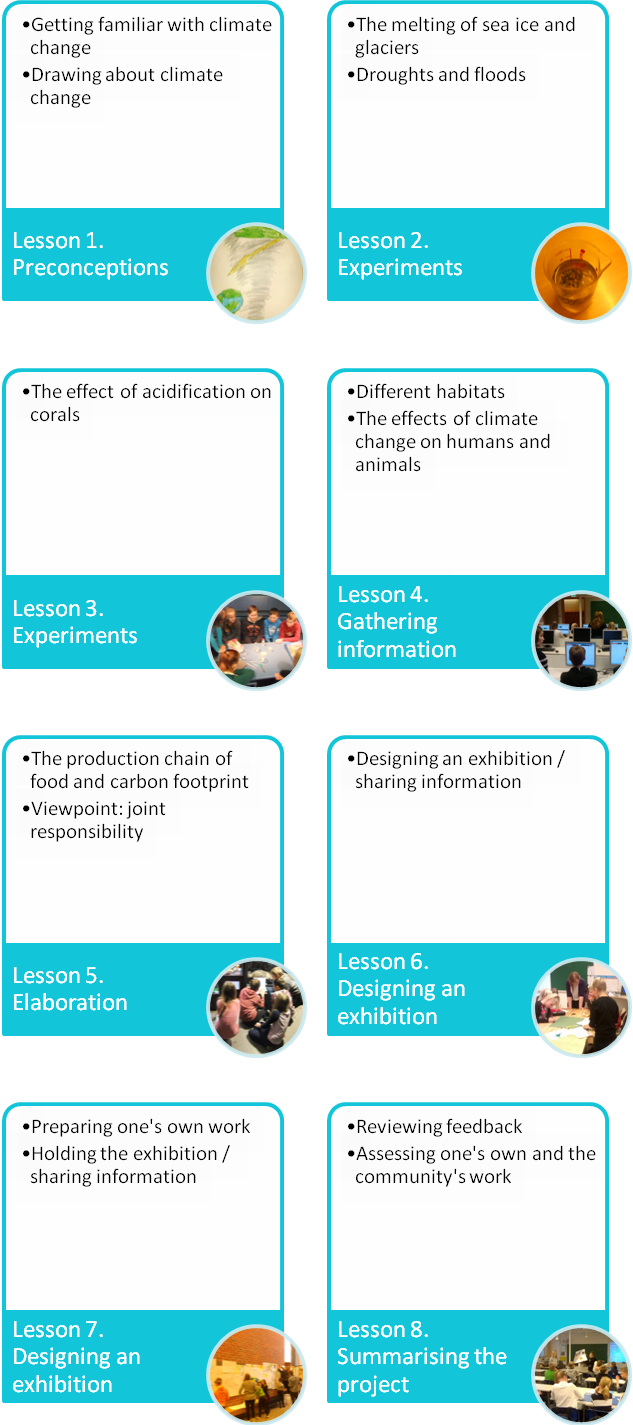
Research Questions
The
Two research questions derived even from the moment of designing the “Ocean Acidification” non-formal activity: (a) How effective can be the non-formal character of the proposed activities, in order to stimulate the students’ interest for this global issue? (b) How much they know about climate change? (c) In which manner and to what extent the students are willing to involve themselves in such demarches?
Purpose of the Study
Generally, it is appreciated that people are aware of the issue of climate change. But there are also other opinions: according to a Pew study (Stokes et al., 2015), an important amount of people was not really concerned that climate change would hurt them; moreover, Yale University researchers (Lee et al., 2015) recently found that 40% of adults worldwide have never heard of climate change! The Yale study concluded that “educational attainment tends to be the single strongest predictor of public awareness of climate change”. Having in view also those issues, the present paper tries to provide an insight into students’ views on climate change and their willingness to engage in mitigations.
In this sense, based on the
The adapted activity scenario related to
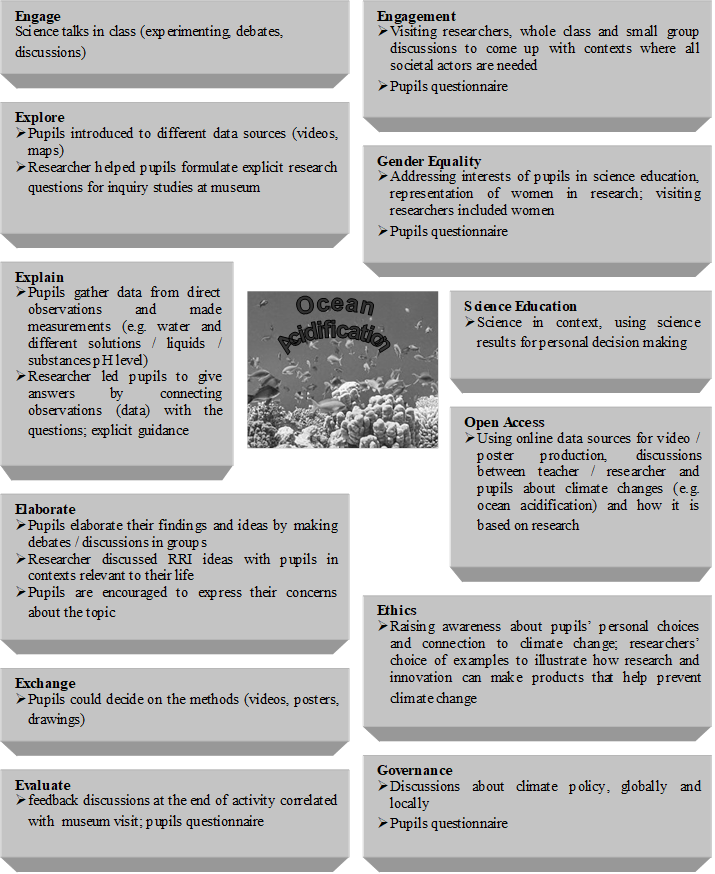
Research Methods
For collecting the secondary school students feedback - after the implementation of the proposed activities where students had been introduced to issues related to global climate change - a specific questionnaire was provided to them (as
Findings
Life in any way is interdisciplinary by nature. The social, economic, technological, environmental issues, and also the irreversible climate change, are problems that cannot be solved by a single disciplinary perspective (Klein, 1990). More connected learning and coherence in the curriculum is the best choice against the artificial fragmentation of the knowledge. Integrated teaching approach is a way to teach students in a more meaningful way; it allows two or more concepts or skills within or across subject areas to be integrated in one lesson. In this approach, knowledge from all of the traditional subjects is accessed without labelling them as such. The concepts or skills are embedded in real-life situations where students are given problem solving tasks that necessitate connection of ideas already known to them with those they encounter for the first time.
In this view, during the “
The process of ocean acidification is the progressive decrease in the average pH of ocean waters caused by the excessive absorption of atmospheric CO2. Over the past few centuries, approximately 50% of the CO2 produced by humans has remained in the atmosphere, 20% has been taken up by terrestrial ecosystems such as tropical forests, while another 30% has been absorbed by the oceans. These numbers suggest that the effects of climate change would likely be much more severe if the oceans were not able to absorb CO2 and act as a global buffer. However, the ability of Earth’s oceans to absorb excess atmospheric CO2 is finite and the carbon dioxide level is starting to be close to buffering capacity limits (Bradley et al., 2009).
The concepts and notions were related with real-life issues beginning with materials / reagents used for experimenting (e.g. natural pH indicator made from red cabbage, food / food ingredients with different pH level, artificial seawater etc.) so that the students to be more familiar with it and at the same time to relate easily notions from different disciplines through main activity topic. It was remarked especially students exciting during experiments performed (e.g. testing pH level of different commonly liquids potable and seawater, buff capacity of seawater, carbon dioxide solubility, acidity impact over marine shells organisms etc.) and how they related theoretical notions that already known form different disciplines with practice during experiments.
At the end of activity, the students have been asked to answer to the
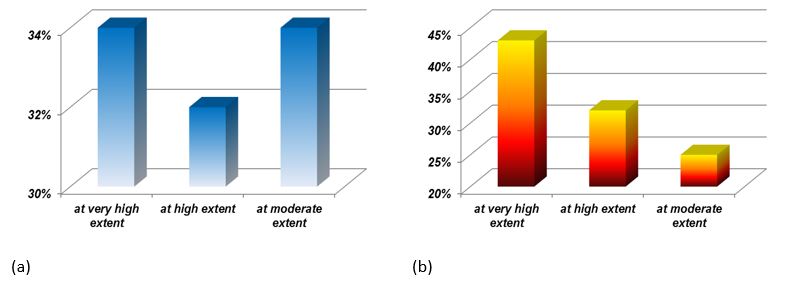
As can be seen in figure
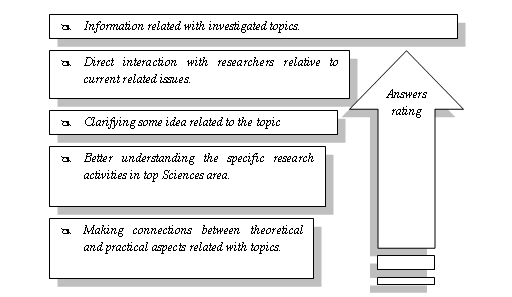
Based on students’ opinions (figure
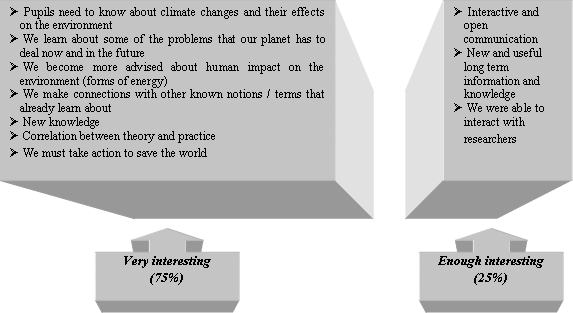
School can intermediate the knowledge transfer related to climate change, as students pointed out, between other things (mentioned in figure
![[Students’ arguments for: (a) promoting / sustaining learning about climate change in school; (b) large public access to information related to climate change]](https://www.europeanproceedings.com/files/data/article/58/2123/MEPDEV2016FA059.fig.006.jpg)
The
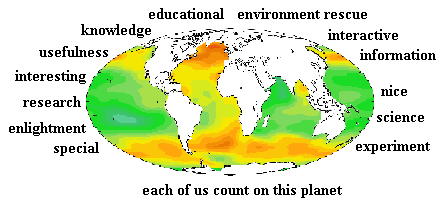
Conclusion
The multidisciplinary approach, involving a team which consists of teacher and researcher, both in formal and non-formal education activities, can enhance the students’ interest, curiosity and active involvement in the teaching-learning process. The adapted non-formal activity:
Numerous reports emphasize the need to revitalize the Science teaching in schools, and it is also often recommended in those reports that Inquiry-based Science Education (or Problem-based Learning) is encouraged, where teaching is conducted through an inductive (rather than deductive) method. The dimensions of
Acknowledgments
This work was funded through the Seventh Framework Programme Project “IRRESISTIBLE - Including Responsible Research and Innovation in Cutting Edge Science and Inquiry-based Science Education to Improve Teacher's Ability of Bridging Learning Environments” - a coordination and support action under FP7-SCIENCE-IN-SOCIETY-2013-1, ACTIVITY 5.2.2 “Young people and science” - Topic SiS.2013.2.2.1-1: Raising youth awareness to Responsible Research and Innovation through Inquiry Based Science Education. This project has received funding from the European Union’s Seventh Framework Programme for research, technological development and demonstration, under grant agreement no 612367. The support offered by the European Commission, through the project mentioned above, is gratefully acknowledged.
References
- Anghel, G. A., Gorghiu, G., & Măntescu, G. (2015). Valorization of RRI Dimensions in Non-Formal Education. A Case Study Related on a Thematic Exhibition in Museum. The European Proceedings of Social & Behavioural Sciences, 7, 21-25.
- Bradley, K. F., Rivera, M., Tamaru, C., Haverkort, R., & Gorospe, K. (2009). Ocean Acidification Lab. Hawai‘i Institute of Marine Biology. Education Program. Retrieved from http://www2.hawaii.edu/~himbed/forms/HIMB-Ocean-Acidification-Lab.pdf, [downloaded July 10th, 2016]
- Clark, J., Laing, K., Tiplady, L. & Woolner, P. (2013). Making Connections: Theory and Practice of Using Visual Methods to Aid Participation in Research. Research Centre for Learning and Teaching, Newcastle University.
- Harlen, W. (2013). Assessment & Inquiry-Based Science Education: Issues in Policy and Practice. Trieste, Italy: Global Network of Science Academies (IAP) Science Education Programme (SEP).
- Klein, J. T. (1990). Interdisciplinarity: history, theory and practice. Detroit: Wayne State University Press.
- Lee, T. M., Markowitz, E. M., Howe, P. D., Ko, Chia-Ying, & Leiserowitz, A. A. (2015). Predictions on public climate change awareness and risk perception around the world. Nature Climate Change, 5, 1014-1020.
- Project Irresistible website (2016), “IRRESISTIBLE - Including Responsible Research and Innovation in Cutting Edge Science and Inquiry-based Science Education to Improve Teacher's Ability of Bridging Learning Environments”, Teaching modules – Climate Change (Finland), http://www.irresistible-project.eu/index.php/en/resources/teaching-modules
- Stokes, B., Wike, R., & Carle, J. (2015). Global Concern about Climate Change, Broad Support for Limiting Emissions. Washington, D.C.: Pew Research Centre.
- SYKE, Aalto University YTK, Finnish Met. Institute (2009), Climateguide.fi. Retrieved from https://ilmasto-opas.fi/en/ [downloaded November 6th, 2016]
- Tang, Q., & Unesco (2015). Rethinking Education: Towards a global common good?, UNESCO publishing 2015, 28-29
Copyright information

This work is licensed under a Creative Commons Attribution-NonCommercial-NoDerivatives 4.0 International License.
About this article
Publication Date
30 July 2017
Article Doi
eBook ISBN
978-1-80296-026-6
Publisher
Future Academy
Volume
27
Print ISBN (optional)
-
Edition Number
1st Edition
Pages
1-893
Subjects
Teacher training, teaching, teaching skills, teaching techniques,moral purpose of education, social purpose of education, counselling psychology
Cite this article as:
Olimid, A. P. (2017). Advancing A Health-Care Cross-Regional Model To Conform EU Policies And Migration Factors. In A. Sandu, T. Ciulei, & A. Frunza (Eds.), Multidimensional Education and Professional Development: Ethical Values, vol 27. European Proceedings of Social and Behavioural Sciences (pp. 496-510). Future Academy. https://doi.org/10.15405/epsbs.2017.07.03.59

